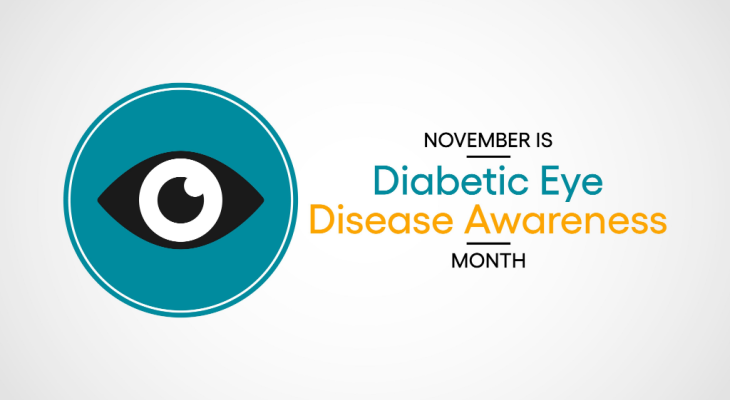
Are You at Risk for Diabetic Eye Disease?
Diabetes not only increases your risk of heart disease, stroke, kidney disease, and nerve damage, but may also affect your eyesight. Unfortunately, many types of diabetic eye diseases only cause symptoms after your vision has already been damaged. Regular visits to the optometrist will help you protect your vision and ensure that you receive prompt treatment if you do develop a potentially sight-stealing disease. Diabetic Eye Disease Awareness Month in November is the perfect time to schedule your appointment.
Who Gets Diabetic Eye Disease?
You're most likely to develop a diabetic eye disease if your blood sugar is often high. You may also experience vision problems if you had diabetes for a long time, even if your blood sugar is well-controlled. Smoking, high blood pressure, or high cholesterol may increase your risk. Diabetic eye diseases affect people with type 1 or type 2 diabetes and include diabetic retinopathy, macular edema, glaucoma, and cataracts.
Diabetic Retinopathy: High Blood Sugar Affects the Blood Vessels in Your Eye
Diabetic retinopathy causes the blood vessels in your retina to swell and leak and may also be responsible for the formation of new, abnormal blood vessels. The retina is made up of several layers of light-sensitive cells at the back of the eye. Once light reaches the retina, it is converted into electrical impulses and sent to the brain for processing. Leaky or abnormal vessels interfere with your vision and may cause permanent vision loss in some cases. Injections and laser therapy can be helpful in stopping the leaks, while steroids are helpful in reducing swelling.
Symptoms. Symptoms aren't common in the early stages of diabetic retinopathy. If the disease isn't diagnosed and treated, you may notice episodes of blurry vision, blind or dark spots, faded colors, difficulty seeing well at night, and floaters (wispy strings or cobwebs that seem to float in front of your eyes).
Macular Edema Causes Central Vision Changes
Blood vessels in the macula, the center part of the retina, swell and leak when you have macular edema. Fluid from the leaky blood vessels triggers swelling in the macula, blurring your vision. Abnormal blood vessels can also form scars that may cause permanent vision loss. Macular edema is more likely to occur if you have untreated diabetic retinopathy. Many of the same treatments used to treat diabetic retinopathy are also helpful for macular edema.
Symptoms. In addition to blurry vision, symptoms of macular edema include double vision and an increase in floaters.
Glaucoma Slowly Destroys Your Eyesight
People who have diabetes have double the chance of developing glaucoma, according to the National Institute of Diabetes and Digestive and Kidney Diseases. Increasing pressure inside the eye damages the optic nerve, which sends light impulses from the eyes to the brain. Damage to the optic nerve is permanent and may cause partial or complete loss of vision. Open-angle glaucoma slowly affects your eyesight, starting with your side vision. Since the changes are gradual, it can be some time before you notice that your field of vision has become smaller. Angle-closure glaucoma happens suddenly and must be treated immediately to prevent permanent loss of vision.
Symptoms. Loss of side vision can occur with open-angle glaucoma, although you probably won't notice any change in your vision in the early stages of the disease. Eye pain, headache, blurry vision, nausea and vomiting are symptoms of angle-closure glaucoma. If you have any of these symptoms, you'll need to visit the emergency room right away.
Cataracts Make the World Look Cloudy
Cataracts occur when the clear lens inside the eye becomes cloudy, making it difficult to see clearly, even with glasses or contact lenses. The American Diabetes Association notes that diabetes may change the structure of the lens, causing you to develop cataracts at a younger age than normal.
Symptoms. Symptoms of cataracts include blurry or double vision and difficulty seeing at night or in dim light. If you have cataracts, colors may look faded. Glare and halos around lights may also affect your vision.
Want to reduce your risk of diabetic eye disease? Call our office to make an appointment with your eye doctor.
Sources:
National Institute of Diabetes and Digestive and Kidney Diseases: Diabetic Eye Disease, 5/2017
Prevent Blindness: Eye Diseases and Conditions
American Diabetes Association: Curious About Cataracts?
American Academy of Ophthalmology: Diabetic Eye Disease, 10/14/2021
Centers for Disease Control and Prevention: Diabetes and Vision Loss, 5/7/2021
